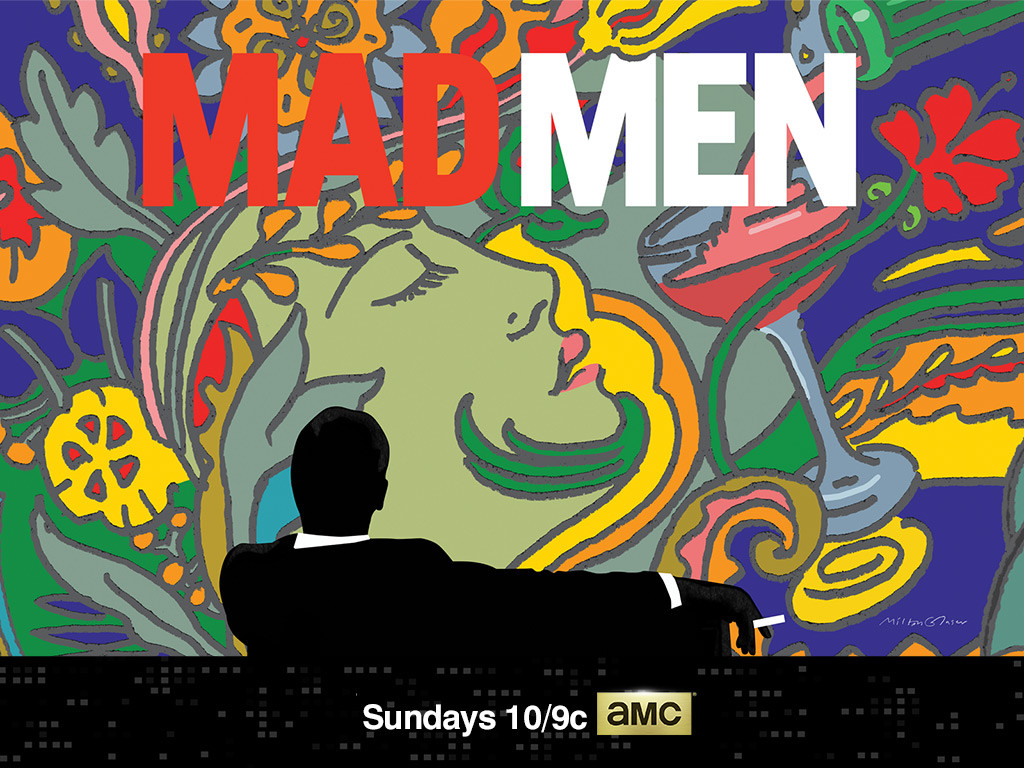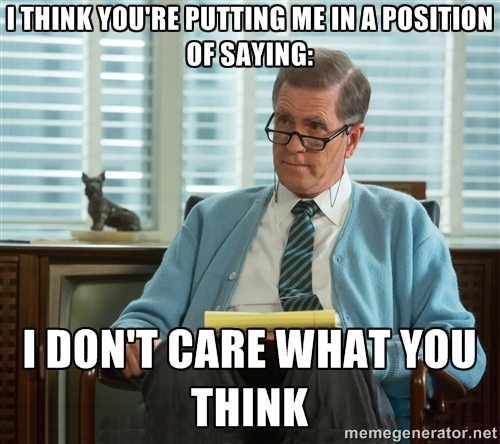Mad Men will begin airing its final episodes on April 5th. Both of us Beans have been fans of the series since it premiered way back in 2007, so we’re going to re-watch one season per week before the final season begins. Each of us will put together their own reflection about what makes each season special, and what aspects stick out on the umpteenth viewing.
Alex:
First off, I want to shout something real quick: WE DID IT! WE WATCHED SEVEN SEASONS OF MAD MEN IN SEVEN WEEKS AND IT FEELS DAMN GOOD TO FINISH SUCH A BIG PROJECT.
Okay, that’s out of the way, so let’s talk about the first half of Season Seven. After last week’s relative slog of a season it was a real pleasure to dive into these episodes. I dunno if Matthew Weiner and company were responding to criticisms of season six, or just following their own muse, but there is a definite up-swing to this mini-season. Not to say it’s all rainbows and lollipops, but upon rewatching it definitely feels like this is the start of a redemption arc for Don and everyone else on the show. Not that a happy ending is guaranteed, of course, but the possibility for these people to find some amount of contentedness is palpable. I can expand on this later, but I’ll toss to you instead, Becky. What jumps out about these episodes to you?
Becky:
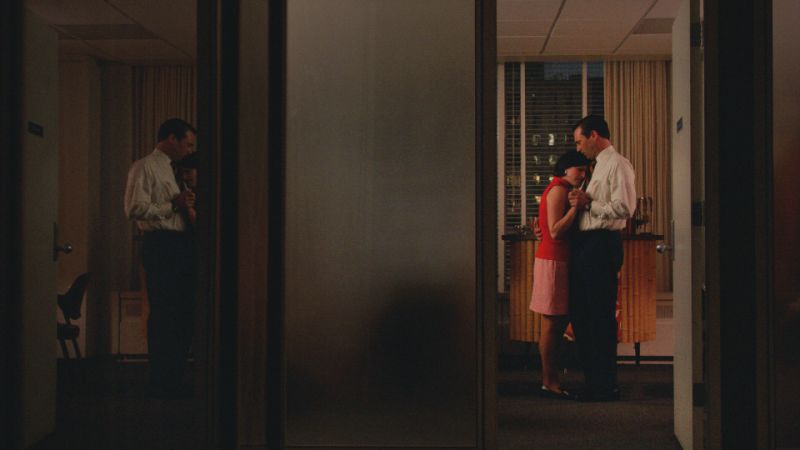 After watching seven seasons of the show, the idea of consequences stands out to me. On the show, and in life, every decision we make leads to a consequence, and how we deal with those consequences says a lot about who we are. Some decisions lead to good end results, while others do not. A lot of the decisions made in previous seasons seemed to lead to bad consequences, such as losing jobs and marriages falling apart. For example, Don lies about his previous life, which leads to his marriage falling apart. We seem him deal with this deceit by falling into a depression, but eventually pulling himself up and finding Megan. He makes up for the mistakes of his last marriage by telling Megan all about his past and tries not to keep any secrets. Now that his second marriage has fallen apart, it will be interesting to see how Don deals with the consequences of the fallout. It’s worth noting that not many of the decisions we see on the show lead to positive outcomes though. But I do agree that the first half of the seventh season feels like it’s on a redemptive arc. But that arc seems to be about the characters deciding to not try to get everything they want in life, but find happiness in the small wins. I don’t expect the show to tie up all the story lines in a neat little bow, and I hope that it doesn’t, but I am excited to see what the final arcs are pertaining to the life choices the main characters have made. Also, I think Mad Men makes interesting commentary through the whole series about the things we want out of life.
After watching seven seasons of the show, the idea of consequences stands out to me. On the show, and in life, every decision we make leads to a consequence, and how we deal with those consequences says a lot about who we are. Some decisions lead to good end results, while others do not. A lot of the decisions made in previous seasons seemed to lead to bad consequences, such as losing jobs and marriages falling apart. For example, Don lies about his previous life, which leads to his marriage falling apart. We seem him deal with this deceit by falling into a depression, but eventually pulling himself up and finding Megan. He makes up for the mistakes of his last marriage by telling Megan all about his past and tries not to keep any secrets. Now that his second marriage has fallen apart, it will be interesting to see how Don deals with the consequences of the fallout. It’s worth noting that not many of the decisions we see on the show lead to positive outcomes though. But I do agree that the first half of the seventh season feels like it’s on a redemptive arc. But that arc seems to be about the characters deciding to not try to get everything they want in life, but find happiness in the small wins. I don’t expect the show to tie up all the story lines in a neat little bow, and I hope that it doesn’t, but I am excited to see what the final arcs are pertaining to the life choices the main characters have made. Also, I think Mad Men makes interesting commentary through the whole series about the things we want out of life.
Alex:
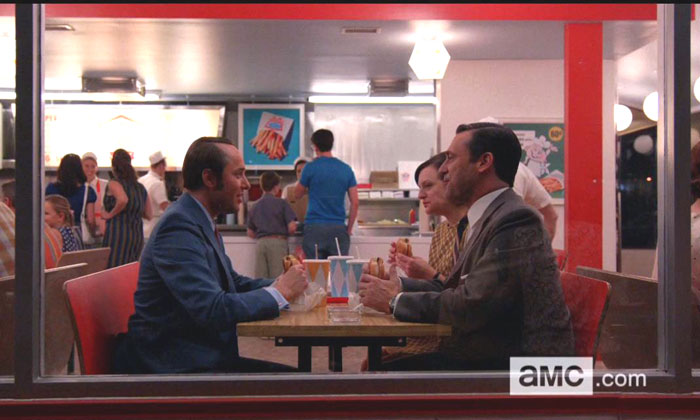 Yeah, at its core Mad Men is obsessed with asking what we value and why that is. It’s a testament to the show’s quietly subversive themes that it makes Madison Avenue look deeply seductive, while consistently undermining the culture of solipsistic consumerism that the American advertising industry created. Look all the way back in the first season, when Don does his immortal pitch for “The Wheel,” and you can see that palpable tug of war between the cynical exploitation of idyllic happiness that these people peddle as their profess and the lack of happiness in their own lives. Or our discussion of Season Five, when “success” was a chimera that just drove everyone to even further desperation and alienation. Mad Men thinks that the American Dream is a lie and the ultimate consequences of pursuing it is death (see: Pryce, Lane). So that redemption arc we both see in the first half of this season is the tantalizing possibility of devoting one’s life to something better. The best example in the season is Don, Peggy, and Pete sharing an accidental family meal together in a fast food joint. They’re not ideal, but they’ve been though enough to feel close. It’s enough. Of course, in classic Mad Men fashion, we get that underlined in the finale by an over-the-top moment.
Yeah, at its core Mad Men is obsessed with asking what we value and why that is. It’s a testament to the show’s quietly subversive themes that it makes Madison Avenue look deeply seductive, while consistently undermining the culture of solipsistic consumerism that the American advertising industry created. Look all the way back in the first season, when Don does his immortal pitch for “The Wheel,” and you can see that palpable tug of war between the cynical exploitation of idyllic happiness that these people peddle as their profess and the lack of happiness in their own lives. Or our discussion of Season Five, when “success” was a chimera that just drove everyone to even further desperation and alienation. Mad Men thinks that the American Dream is a lie and the ultimate consequences of pursuing it is death (see: Pryce, Lane). So that redemption arc we both see in the first half of this season is the tantalizing possibility of devoting one’s life to something better. The best example in the season is Don, Peggy, and Pete sharing an accidental family meal together in a fast food joint. They’re not ideal, but they’ve been though enough to feel close. It’s enough. Of course, in classic Mad Men fashion, we get that underlined in the finale by an over-the-top moment.

That song and dance moment was astounding when we first watched it last Spring, but it nearly moved me to tears last night. Days after humanity transcended its existence by landing on the moon, here’s an apparition of Bert telling us that “The moon belongs to everyone. The best things in life are free.” Don should listen. I hope he does. Honestly, I hope that we all do.
Last question of this series, Becky, and it’s something we’ve talked about a lot while watching all these episodes: Is Don Draper a good man?
Becky:
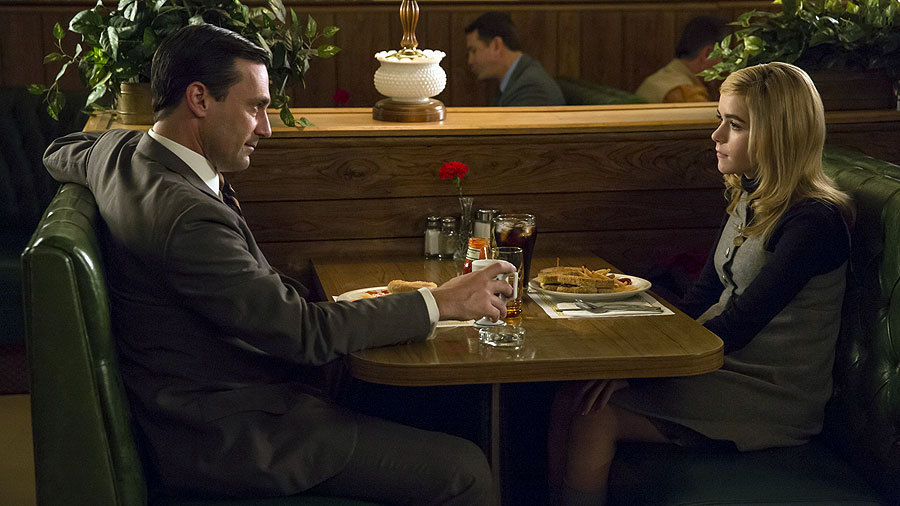 I think that Don is a good man. He does a lot of things that are self serving and without a thought for other’s feelings, but I do think that, under it all, he is good. When his half-brother, Adam, approaches him early in the series, he refuses to accept their family tie and re-connect with him, which leads to Adam committing suicide. I think this is something of a wake up call to Don, showing him how all of his actions have consequences. Subsequently, when a friend is in need he attempts to offer them assistance. Usually this assistance is in a monetary form, such as when Midge shows up addicted to heroin, or when Stephanie phones him and says she’s eight months pregnant. But even before that he set up Anna Draper in her own home and takes care of her bills for the rest of her life. She accepted Dick Whitman for who he was and allowed him to take over the life of “Don Draper.” I think he would have set up Stephanie with the same thing if he had made it out to California fast enough. But he does have a strong streak of vindictive resentment when he feels threatened and He can be vicious when lashing out. Pete tries to blackmail him and gets stuck as second-fiddle for years. Peggy grows into her own and Don takes her for granted or needles her. Ted Chaough threatens his status as the agency’s creative alpha and Don fucks with his head mercilessly. In the end, though, he still stands up for the people nearest to him, even after fighting with them. He pays for Pete’s partnership share when the company is going under. He helps Peggy take the lead on the Burger Chef campaign. He even sacrifices his own plans so that Ted can move to L.A. and save his marriage.
I think that Don is a good man. He does a lot of things that are self serving and without a thought for other’s feelings, but I do think that, under it all, he is good. When his half-brother, Adam, approaches him early in the series, he refuses to accept their family tie and re-connect with him, which leads to Adam committing suicide. I think this is something of a wake up call to Don, showing him how all of his actions have consequences. Subsequently, when a friend is in need he attempts to offer them assistance. Usually this assistance is in a monetary form, such as when Midge shows up addicted to heroin, or when Stephanie phones him and says she’s eight months pregnant. But even before that he set up Anna Draper in her own home and takes care of her bills for the rest of her life. She accepted Dick Whitman for who he was and allowed him to take over the life of “Don Draper.” I think he would have set up Stephanie with the same thing if he had made it out to California fast enough. But he does have a strong streak of vindictive resentment when he feels threatened and He can be vicious when lashing out. Pete tries to blackmail him and gets stuck as second-fiddle for years. Peggy grows into her own and Don takes her for granted or needles her. Ted Chaough threatens his status as the agency’s creative alpha and Don fucks with his head mercilessly. In the end, though, he still stands up for the people nearest to him, even after fighting with them. He pays for Pete’s partnership share when the company is going under. He helps Peggy take the lead on the Burger Chef campaign. He even sacrifices his own plans so that Ted can move to L.A. and save his marriage.
But you know who is not a good man? The Unsinkable Lou Avery.
Alex:
HOW DARE YOU! The Unsinkable Lou Avery is a paragon of virtue.
No, he’s the worst kind of self-righteously mediocre asshole. I love to hate him. I live to hate him.
Don is far more enigmatic. Despite your argument, I still have some trouble calling him a good man. He’s done some unconscionable things. But he’s always been more prone to self-destructive than harming others. And he does seem to truly care about his children and colleagues. I think he’s just suffered too much trauma and bought into the myth of American Dream so much that he cannot tell the difference between doing the right thing and doing the thing that feels right. That’s not an easy feet for any of us. It’s the final seven episodes that start on Sunday which will reveal whether he completes that redemption arc or finally falls into that miasma of alluring images that we see in the credits sequence. I hope it turns out well.

